Introduction
The evolution of Artificial Intelligence (AI) has been nothing short of transformative for the field of software development. From its early days, marked by the pioneering efforts of visionaries like Alan Turing and John McCarthy, to the sophisticated machine learning and neural networks of today, AI has continuously reshaped the way coding is approached. This article delves into the historical context of AI, charting its progress from rudimentary beginnings to the advanced tools that now drive efficiency and productivity in development.
It explores how AI-powered coding assistants are not just aiding but actively collaborating with developers, enhancing code quality and reducing time to market. Furthermore, it examines the latest advances in AI technology, such as deep learning and natural language processing, and their profound impact on coding practices. As AI continues to evolve, it presents both challenges and opportunities, promising a future where human ingenuity and machine intelligence work seamlessly together to push the boundaries of what’s possible in software engineering.
Historical Context: The Early Days of AI
Artificial Intelligence (AI) traces its origins to the mid-20th century with visionaries like Alan Turing and John McCarthy pioneering the exploration of machine intelligence. Their foundational work set the stage for future advancements, allowing the possibility of computers performing tasks traditionally requiring human cognition. However, the initial optimism was tempered by significant challenges, particularly limited computational power and rudimentary algorithms, which stunted progress for decades.
As the field evolved, the intricate interplay of collaboration and interpersonal relationships among key figures like McCulloch, Wiener, Pitts, and Rosenblatt played a crucial role in advancing cybernetics and neural networks. These pioneers' contributions were often overshadowed by debates over credit for innovations such as the backpropagation algorithm, highlighting the contested nature of scientific progress.
The influence of funding, media attention, and alliances further shaped Ai's trajectory, determining which research approaches gained prominence. The revival of neural networks post-1970s, coupled with the rise of personal computing and the internet, significantly transformed the AI landscape. Missed opportunities for collaboration between symbolic AI and neural network researchers underscore the potential for a more unified approach in today's era, free from the historical baggage of past debates.
'In recent progress, researchers have employed techniques like Fourier analysis, a 200-year-old math method, to gain insights into neural networks, illustrating the ongoing quest to unravel Ai's complexities.'.
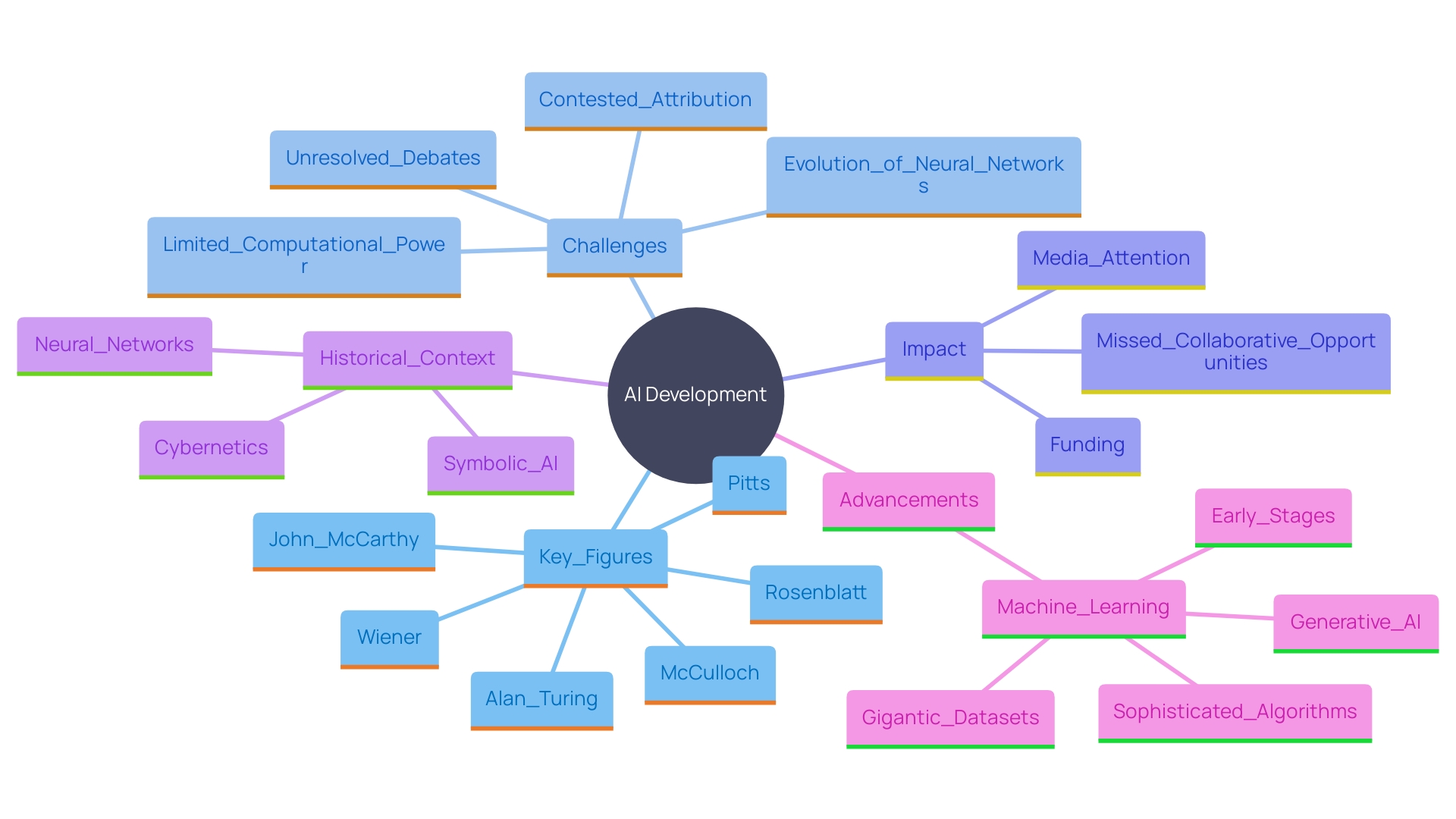
The Rise of Machine Learning and Neural Networks
The resurgence of AI in the 21st century can be largely attributed to the advent of machine learning and neural networks, which have driven significant advancements in software engineering. By harnessing vast amounts of data and leveraging more powerful computing resources, developers began creating systems capable of learning from experience. Google’s internal tooling, for example, has seen dramatic improvements with AI-powered code completion, demonstrating the practical benefits of these technologies.
This evolution has allowed the creation of sophisticated models that can make predictions, recognize patterns, and improve over time. In 2019, many software engineers could not have imagined the extent to which AI would assist in their work. By 2024, a significant number of engineers have utilized machine learning-based autocomplete systems, transforming their coding practices.
Intuit's use of generative AI resources has also demonstrated how AI can standardize code and documentation, enhancing the end-to-end development process. The effect on efficiency is significant: teams employing AI resources finished tasks approximately 30% quicker on average than those utilizing conventional methods. This boosts not only speed but also accuracy, as automated testing in virtual environments reduces the risk of errors in live products.
The rapid adoption and constant advancement of AI tools for developers underscore their transformative impact on the industry. Turing's research highlights a 25% average increase in developer productivity through AI-accelerated software creation, pointing to a fundamental shift in how technology and human expertise interact. As AI continues to evolve, its role in shaping the future of software engineering becomes increasingly pivotal.
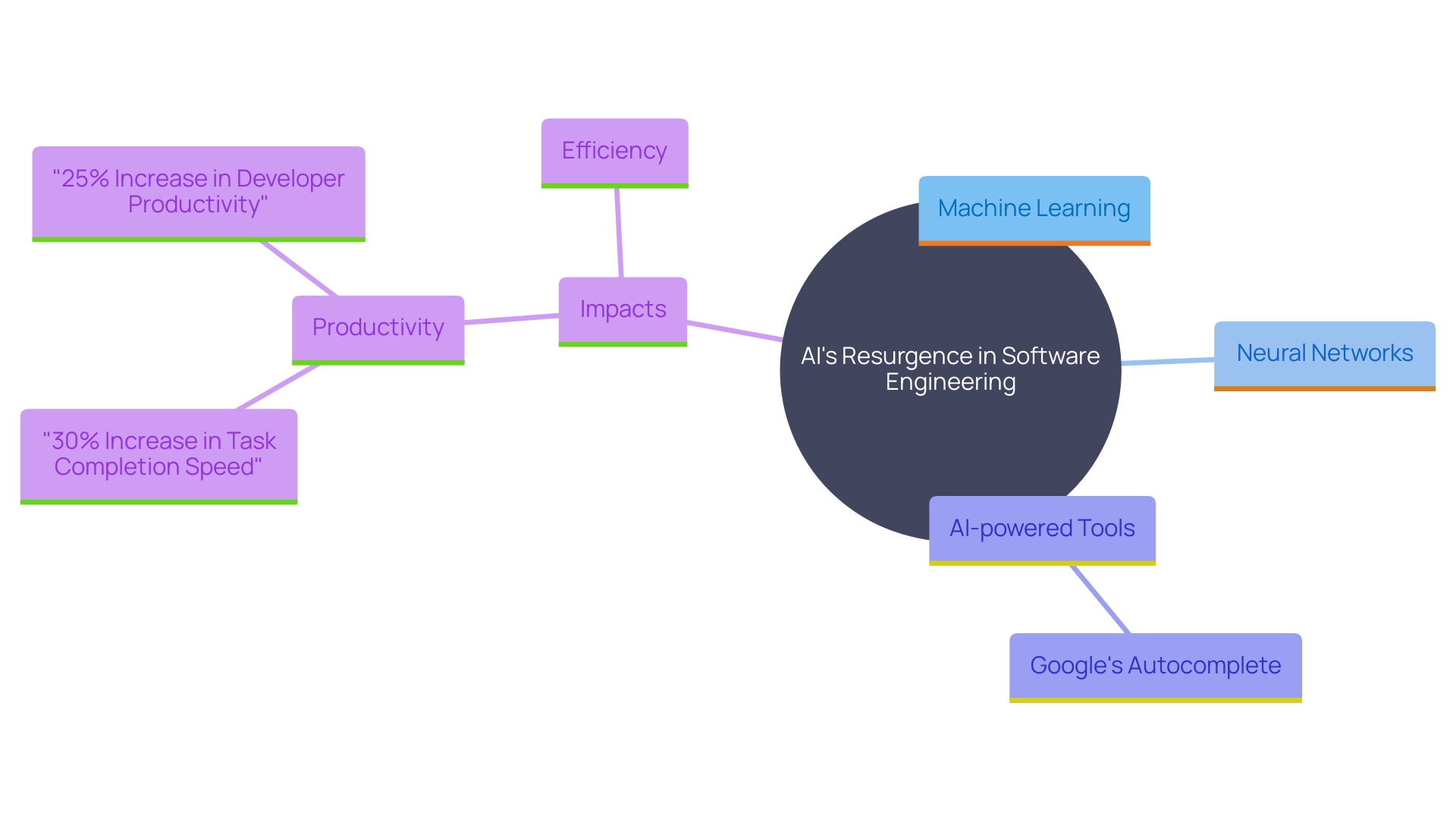
AI in Software Development: Automation and Efficiency
The incorporation of AI into software development has profoundly changed the programming landscape. AI-driven coding assistants and smart resources now simplify processes, allowing developers to produce more efficient and mistake-free code. According to a comprehensive study, teams utilizing AI resources completed their tasks about 30% faster compared to those using traditional methods. This significant boost in productivity underscores the transformative impact AI is having on the industry.
AI-driven solutions not only speed up the creation cycle but also enable teams to concentrate on complex problem-solving instead of routine tasks. This shift enhances overall productivity, allowing organizations to deliver software solutions that meet modern demands swiftly. The swift acceptance and progress of AI systems are transforming software engineering, leading to significant efficiency improvements and cost reductions across multiple sectors.
Prominent technology firms, like Google, have already incorporated AI resources into their creation settings, further demonstrating the practical advantages. For instance, Google's internal AI-powered programming completion tools have significantly enhanced developer productivity and satisfaction. The broader implications of these advancements suggest that AI will continue to evolve, offering even more sophisticated capabilities in the future.
As AI technologies advance, they will become more efficient at automating intricate activities in software creation, from natural language programming generation to automated testing and intelligent program completion. This evolution is not merely a fleeting trend but a crucial advancement for software engineering, promising quicker development cycles and superior quality.
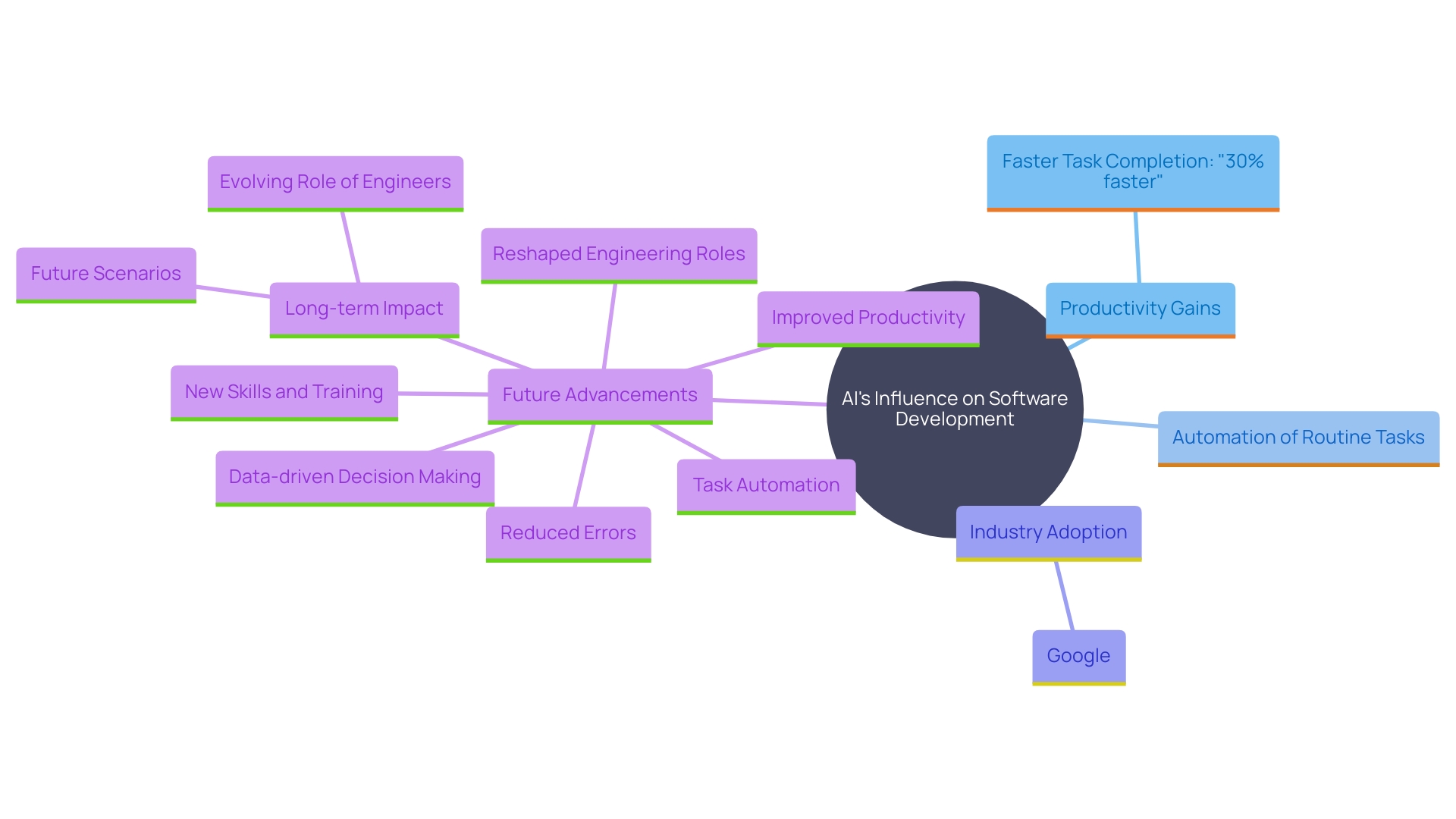
Impact of AI on Coding: From Assistance to Collaboration
Ai's contribution to programming has transcended from mere assistance to a dynamic collaboration between humans and machines. Contemporary programming resources, driven by AI, now provide immediate feedback, recommend snippet examples, and independently troubleshoot problems. For example, a randomized controlled trial involving hundreds of software creation groups from a large multinational corporation showed that teams utilizing AI resources finished tasks approximately 30% quicker in comparison to those employing conventional resources. These AI applications, incorporating natural language program generation, automated testing, and smart programming completion, significantly enhance productivity and efficiency.
This collaborative synergy not only accelerates development processes but also enhances code quality and reduces time to market. As AI continues to advance, it provides developers with a reliable partner, enabling them to focus on innovative solutions. The swift embrace and ongoing development of AI resources highlight their transformative effect on the industry, promising significant efficiency improvements and cost reductions across various sectors. Embracing this technology allows companies to streamline operations, thus driving productivity and fostering an environment of continuous improvement.
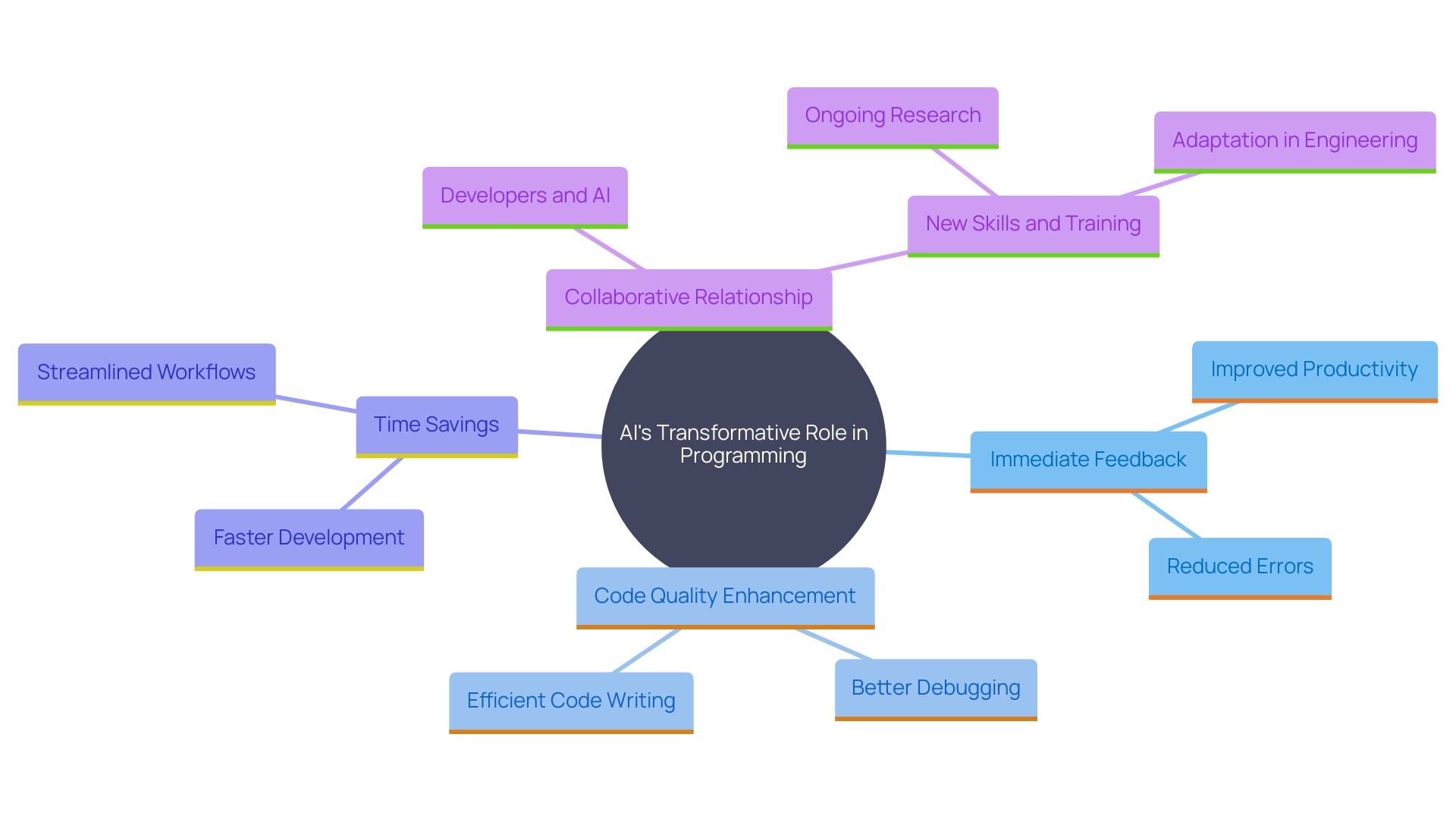
Advances in AI Technology: Deep Learning and NLP
Recent advancements in AI technology, particularly in deep learning and natural language processing (NLP), have transformed programming practices. Deep learning algorithms facilitate more advanced data analysis and decision-making abilities, while NLP promotes more intuitive interactions between developers and programming resources. These technologies have significantly improved the ability to produce programming suggestions based on natural language prompts, making software development more accessible and efficient.
A randomized controlled trial involving hundreds of software creation groups from a large multinational corporation demonstrated that teams utilizing AI-powered resources finished their tasks approximately 30% quicker on average compared to those using conventional resources. These AI resources included capabilities like natural language code generation, automated testing, and intelligent code completion. The results suggest that AI-based coding assistants can significantly boost software development speed and productivity, leading to major efficiency gains and cost savings across various industries.
The positive effect of AI resources on developer productivity is well-documented. For instance, AI pair-programming applications such as GitHub Copilot have demonstrated substantial advantages for developers of all skill levels, particularly those who are beginners. These tools assist in enhancing task efficiency, product quality, cognitive load, and overall enjoyment and learning during the programming process.
As AI technologies continue to evolve, they promise to redefine how programming is approached across industries. By tackling issues like AI errors, privacy threats, and ethical dilemmas, AI programming aids can be more efficiently and responsibly incorporated into software creation, ultimately improving human programming skills.
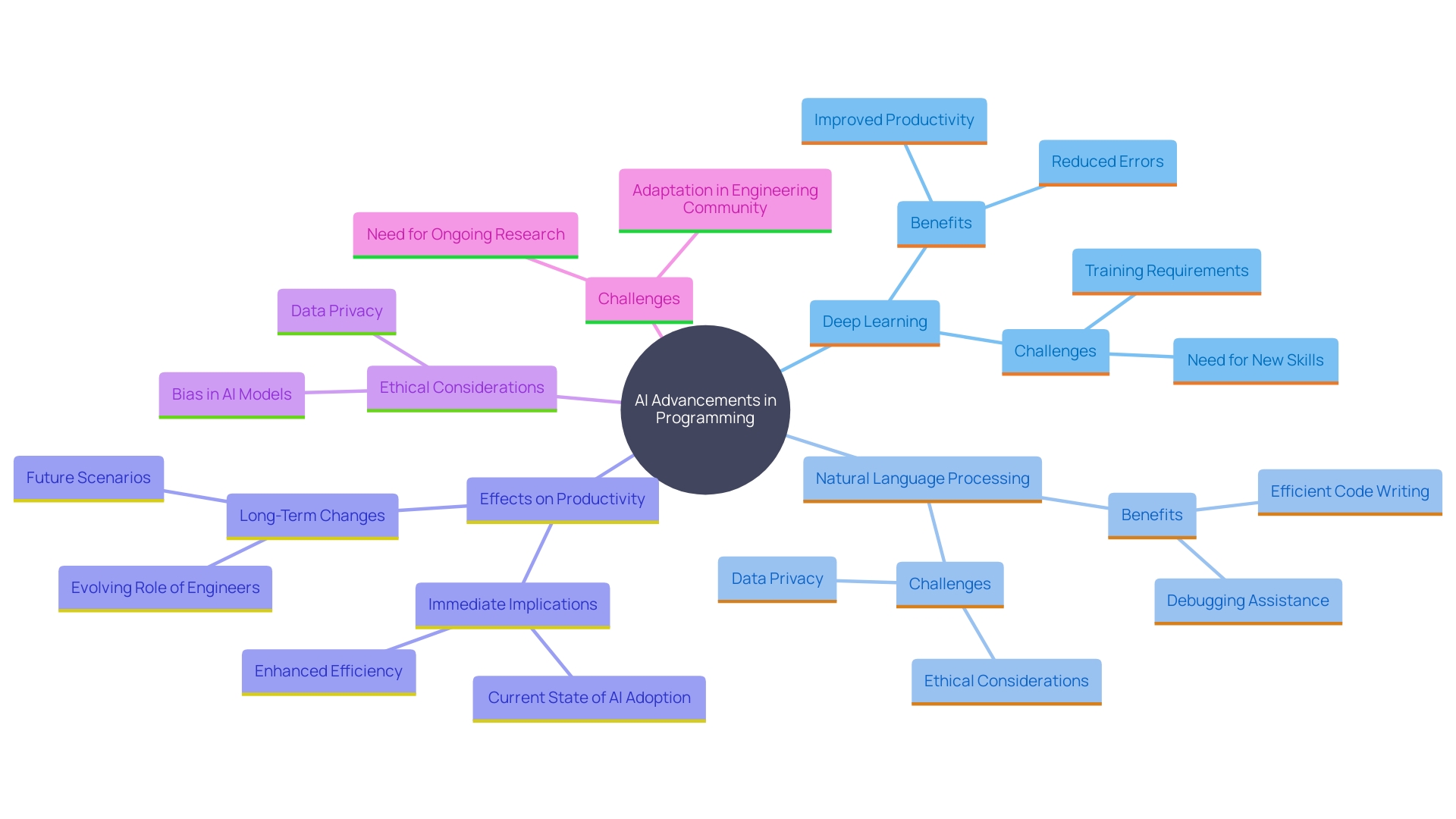
AI-Powered Coding Tools: Examples and Applications
AI-driven programming resources are transforming the software creation environment by tackling several issues inherent in the programming process. Tools such as GitHub Copilot and Tabnine offer developers with context-aware programming suggestions, significantly improving development efficiency. In a randomized controlled trial conducted with Accenture, developers using GitHub Copilot reported improved productivity and satisfaction. These tools help streamline tasks by offering real-time programming completions, as seen with platforms like Kite, which adapt to the developer's coding style and project context.
Moreover, GitHub Copilot's influence extends beyond mere programming suggestions. According to a comprehensive study examining over 150 million lines of code, AI assistants have led to a notable increase in churn code and a decrease in code reuse. Despite these challenges, the adoption of AI programming tools continues to grow rapidly. Early last year, GitHub celebrated over 100 million developers on its platform, with projections indicating a potential user base of one billion in the near future due to the ease of programming in natural language.
However, the use of AI in coding is not without its drawbacks. Developers have raised concerns about the consistency and clarity of AI-generated programming. 'As one user observed, different prompts can lead to varying programming quality, making debugging more resource-intensive.'. Nonetheless, the potential for AI to transform the creation environment is immense, enabling rapid prototyping, code understanding, and even automated testing. As the technology evolves, it promises to further reduce the learning curve for new developers and open up advanced techniques without requiring extensive prior knowledge.
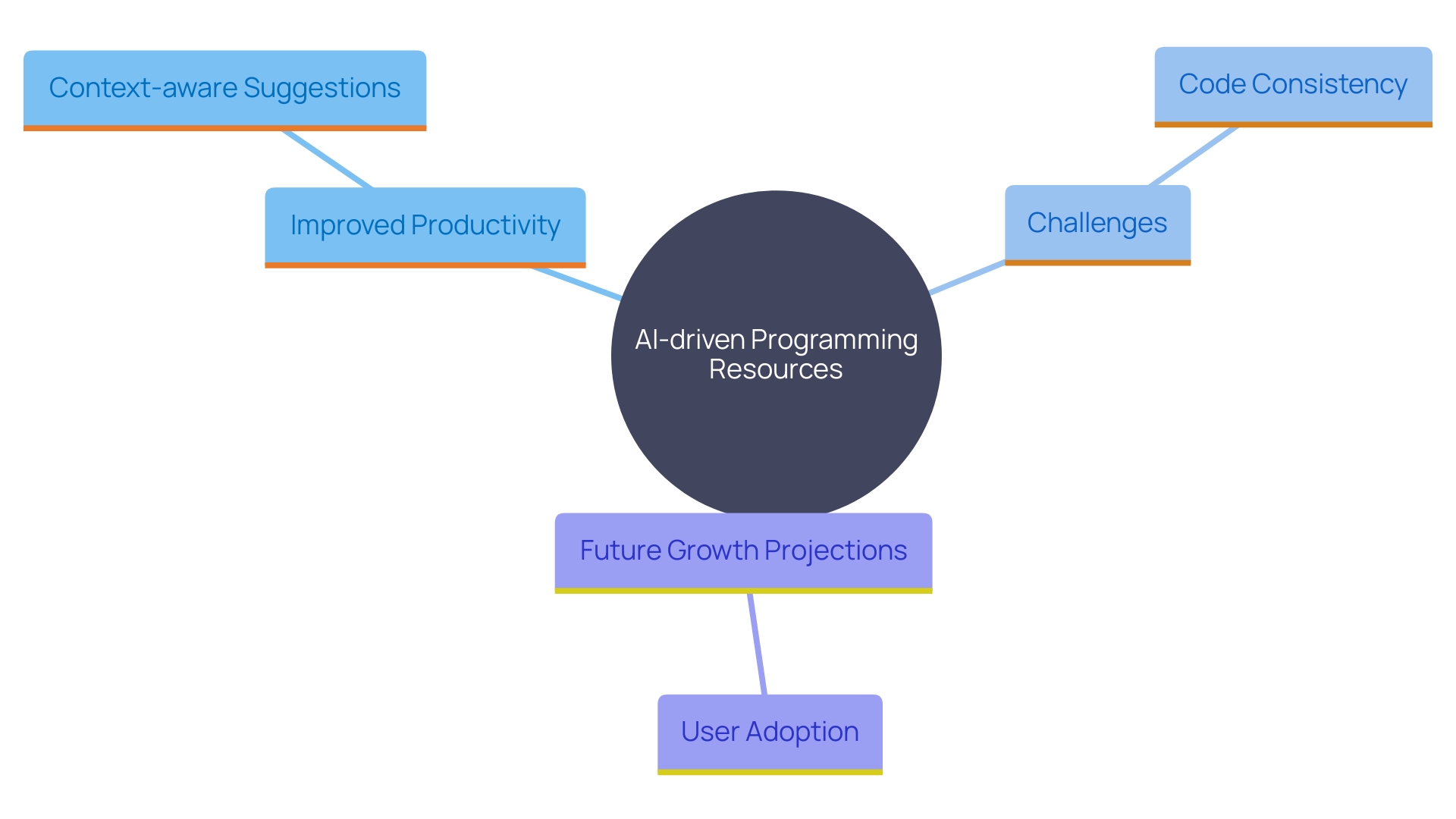
The Future of AI in Coding: Challenges and Opportunities
As AI technology progresses, it brings both challenges and opportunities to the coding landscape. 'Ethical considerations and potential job displacement are significant issues that need addressing as AI becomes more embedded in the software creation process.'. However, the benefits, such as enhanced creativity, efficiency, and problem-solving capabilities, are substantial.
Recent studies suggest that AI-driven resources can significantly enhance progress rate and efficiency. In a randomized controlled trial involving software creation teams from a large multinational corporation, teams using AI tools finished their tasks about 30% quicker on average than those using traditional tools. This indicates that AI-driven programming assistants, which encompass features such as natural language code creation and automated testing, can result in significant efficiency improvements and cost reductions across different sectors.
AI programming helpers are gaining more popularity, with 76% of developers intending to utilize them in their development processes this year. These tools excel in analyzing extensive codebases, identifying patterns, and recommending improvements that might be missed by human developers. The incorporation of AI in programming has been a game-changer for code quality, as acknowledged by 57% of surveyed professionals.
By embracing AI technology, developers can unlock new levels of innovation and drive the next generation of software solutions, creating a future where AI and human intelligence work in harmony. As one researcher aptly put it, 'The goal is to harness the potential of AI to enhance, rather than replace, human coding abilities.' This approach not only augments developer capabilities but also ensures that AI is used responsibly and effectively in the software development workflow.
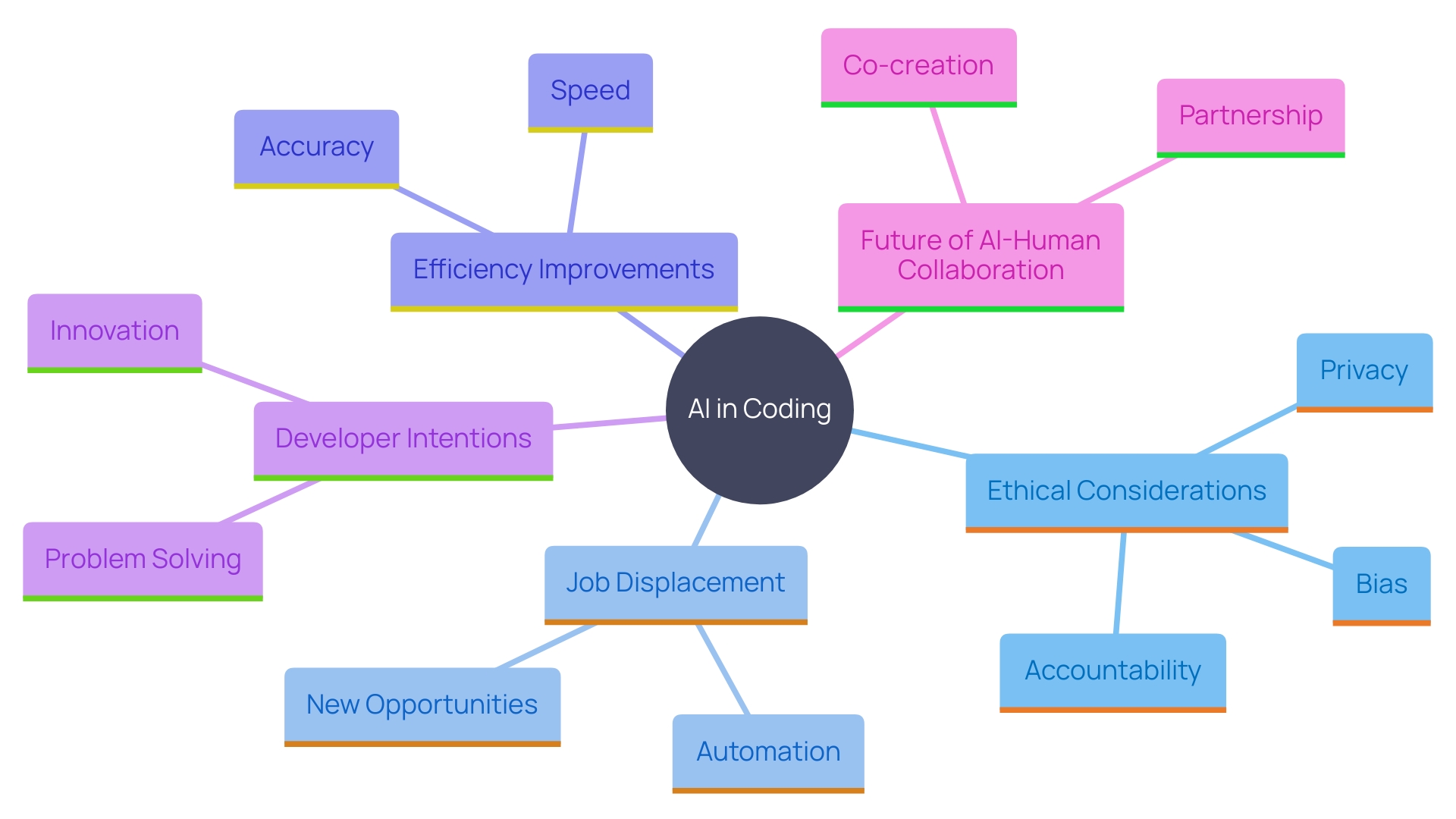
Conclusion
The evolution of AI in software development has transformed coding practices, enhancing both efficiency and productivity. From the early days of machine intelligence to the sophisticated tools available today, AI has progressed from assisting developers to collaborating with them. This shift allows for real-time feedback, intelligent code completion, and automated testing, resulting in significant time savings and improved code quality.
The rise of machine learning and neural networks has been pivotal, enabling developers to leverage vast datasets and powerful computing resources. Studies indicate that teams utilizing AI tools can complete tasks approximately 30% faster than those relying on traditional methods. The integration of AI technologies not only accelerates development cycles but also empowers teams to focus on higher-level problem-solving, driving major efficiency gains across various industries.
As AI technologies such as deep learning and natural language processing continue to advance, they promise to redefine coding practices further. AI-powered coding assistants are now essential for enhancing developer productivity, particularly among junior programmers who benefit from the guidance these tools provide. Embracing AI in software development not only unlocks new levels of innovation but also fosters a collaborative environment where human ingenuity and machine intelligence work together seamlessly.
Looking ahead, the future of AI in coding presents both challenges and opportunities. Ethical considerations and job displacement concerns must be addressed to harness AI's full potential responsibly. However, the benefits of improved creativity, efficiency, and problem-solving capabilities are substantial.
By integrating AI into development workflows, organizations can drive the next generation of software solutions, ultimately creating a dynamic landscape where AI enhances human capabilities rather than replacing them.
Frequently Asked Questions
What are the origins of Artificial Intelligence (AI)?
AI traces its origins to the mid-20th century, primarily through the work of pioneers like Alan Turing and John McCarthy, who explored machine intelligence.
What challenges did AI face in its early development?
Early AI faced significant challenges such as limited computational power and basic algorithms, which slowed down progress for decades.
How did collaboration among key figures influence AI's evolution?
Collaboration among influential figures like McCulloch, Wiener, and Rosenblatt played a vital role in advancing cybernetics and neural networks, despite debates over credit for innovations.
What caused the resurgence of AI in the 21st century?
The resurgence of AI is largely attributed to the advent of machine learning and neural networks, which have enabled the development of systems that learn from vast amounts of data.
How has AI improved software development efficiency?
AI has allowed teams to complete tasks approximately 30% faster compared to traditional methods, significantly enhancing productivity and accuracy in software development.
What are some specific applications of AI in programming?
AI tools, such as Google’s AI-powered code completion, and resources like GitHub Copilot, assist developers by providing real-time programming suggestions and improving code quality.
What impact does AI have on developer productivity?
AI tools have been shown to increase developer productivity by approximately 25%, allowing programmers to focus more on complex problem-solving rather than routine tasks.
How do AI-driven programming resources affect the coding landscape?
AI-driven tools streamline development processes, reduce errors, and enhance code quality, transforming how developers approach software creation.
What are the ethical considerations surrounding AI in programming?
Key ethical concerns include potential job displacement and the need for responsible AI use, ensuring that AI enhances rather than replaces human coding abilities.
What future advancements can we expect from AI in software development?
As AI technology continues to evolve, it is expected to automate complex programming tasks, improve collaboration, and redefine how programming is approached across various industries.




